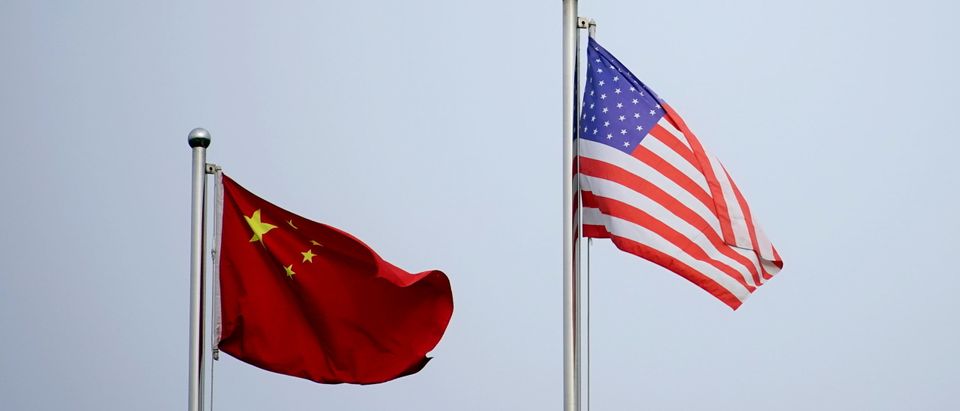Editor’s note: We endeavor to bring you the top voices on current events representing a range of perspectives. Below is a column arguing that rolling back Trump’s China tariffs would harm the country. You can find a counterpoint here, where Reason’s Max Gulker argues that rolling back the tariffs will represent a win for American consumers.
President Joe Biden’s job approval ratings are in freefall, tracking inversely with inflation — the higher the inflation rate, the lower Biden’s ratings.
Biden could soon attempt to cover for his own economic failures by dropping tariffs on Chinese goods. That would be a mistake.
The voting public largely — and correctly — sees inflation as mostly the fault of bad government policies. Go to war on the oil and gas industry, get less of it. Fire up the regulatory machine, increase costs to run a business. Print trillions of dollars and pay people to not work, get inflation and a tight labor market with millions sitting on the sidelines.
The COVID-19 public health crisis and the response to it also shares some blame. Global supply chains were disrupted as some nations opted for aggressive measures to contain the virus — measures that, in retrospect, appear to have made no difference as the virus made its way across the world.
And then there’s Russia’s war on Ukraine. While the fault for the invasion must rest squarely with Russian President Vladimir Putin, the fact is that America’s deterrence failed under Biden, only months after the chaos in Kabul and a credibility shredding defeat.
Finally — and this is vital politically — there’s former President Donald Trump’s tariffs on imports from the People’s Republic of China. With the Trump tariffs, Biden now has a convenient foil — a villain to blame for higher costs. By raising the issue of Trump’s tariffs in Chinese imports, Biden can cast the blame for inflation at Trump’s feet and, unlike blaming the “Putin price hike,” it’s an issue that he has the power to address, promising relief will be felt — just after the midterm elections.
Jason Furman, former Chairman of the Council of Economic Advisors under President Barack Obama and now an economist at Harvard, is urging Biden to roll back Trump’s tariffs on China. Speaking on NBC, Furman said, “I’d love to see them lift most of the tariffs that President Trump imposed. That would bring down inflation directly….”
But would it? The short answer is not likely and, in the long run, perhaps 1%, maybe less. There are two reasons for this.
First, China is pursuing its mercantilist objective of maintaining market share and discouraging a shift in manufacturing away from the one-party state. This caused them to largely eat the billions in tariffs imposed. The monthly inflation numbers after Trump kicked off the trade war in 2018 to pressure China into playing by the rules show this.
Second, the goods imported into America have already paid the tariffs and, in a slowing economy, it will take months for new goods to replace them — though, if Biden does relax the tariffs, look for China to quickly raise prices to increase profits.
Of course, Professor Furman, and many others, aren’t entirely free from conflicts of interest as they lobby Biden to reduce tariffs on China. In Furman’s case, his employer, Harvard University, has received millions in contracts and gifts from China and Hong Kong (functionally the same nation today) in the past two years, the most of any foreign power.
Robert Lighthizer, the U.S. trade representative during Trump’s four years in office, points out in a letter to the Wall Street Journal that, “Inflation today is highest in the fuel, food, used-cars and some services sectors. None of these is imported from China.” While “Rolling back the tariffs would essentially give the adversary a pass to cheat and cost many Americans their jobs. The China challenge is more important to the long-term prosperity and security of our country than the current inflation.”
Of note, even as China reneged on its promise to buy an extra $200 billion of goods from America — though the COVID-19 slowdown was a factor — American imports from China from grew eight percent in 2020, 28% in 2021 and 15.1% in the first five months of 2022.
But U.S.-China relations continue a downward spiral over China’s massive military buildup, its threats to Taiwan, Japan and other nations in the Indo-Pacific, and its support for Russia’s war on Ukraine. This should cause us to view our increasing imports from China through the lens of national security with items of vital importance to our economy (auto parts and integrated circuits), national security (rare-earth minerals) and well-being (active pharmaceutical ingredients) which would give China leverage in a conflict.
Fortunately, despite Biden’s anti-jobs regulatory push, many American companies are starting to “onshore” out of China, with the construction of new manufacturing facilities in the U.S. more than doubling in a year, far ahead of the overall 10% increase in construction.
A Biden reversal of Trump’s tariffs on China threatens to reverse these gains for America and its workers while delivering little to nothing in the way of inflation relief.
Chuck DeVore is a vice president with the Texas Public Foundation, a former California State Assemblyman, and a retired U.S. Army lieutenant colonel


